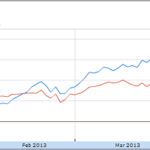There is nothing like a privatisation, even a partial one, to bring out the closet capitalists to join the ranks of those who, professionally, spend most of their time buying stocks and shares.
With the Royal Mail issue, there was a huge amount of activity through the grey market as everyone wanted to ensure they get their share of the action. In the event, when the market opened, the shares were trading at a premium of around 33%, creating the usual response that they had been priced too low in the first place.
The grey market tends to be a self-fulfilling prophesy; investors believe an IPO will be profitable so they create a premium in their bid ceiling and that carries through to an early surge in the actual price.
In the case of Royal Mail though, there could be more to the grey scramble than simple early profiteering. In many respects the Royal Mail is slightly different to other privatisation offers. With gas, water and British Telecom the future trading scenarios were hardly genuine competition; gas and water both had huge monopolies that reflected the massive investment necessary, but against an expectation of increased demand, albeit with protective regulation. Similarly, BT had to subsidise new competition by making the infrastructure available.
With Royal Mail, on the other hand, there does not seem to be a threat of excessive and profit limiting regulation, unless postal charges are heavily capped, but with the vast exodus to e-mail that may not matter; nor is there a huge investment and asset commitment that is different to other private sector mail carriers. This is also a business where considerable work has already been done on efficiency and improving productivity, much of the pain has already been taken and the culture is already moving towards the market and customers.
Given that, it could be that this is an IPO that has been under-priced, probably for political reasons, but one where the underlying company performance actually bodes well for future returns and that the grey market activity is actually longer term investors sensing an opportunity not to be missed.
IG Index, one of the leading spread betting firms, were throughout last week predicting that the price would continue to rise, probably even beyond the conditional trading status that ends on Tuesday. What is clear is that investors no longer see the Royal Mail as just primarily a letter carrier and see a real future fighting on a level playing field with big competition.
Still, the Royal Mail have been doing it for some 500 years, they must have learnt something in that time.











{ 0 comments… add one now }